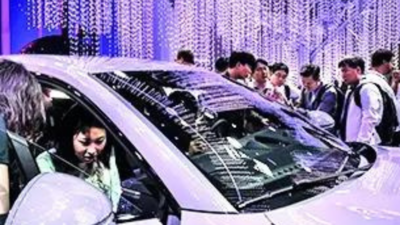BERLIN: After decades of dominating China’s market for high-performance cars with precision engineering, German automakers are losing out to Chinese rivals that have shifted the definition of a high-end car to one that is electric, smart and affordable.
Many new Chinese vehicles resemble their German rivals, including the popular Xiaomi SU7, which mimics Porsche’s Taycan. The SU7 rivals the Taycan in power and braking, but also includes integrated artificial intelligence that can, for instance, help with parking and greet drivers with their favorite song. The cherry on top: It sells for roughly half the price of a Taycan. As a result, German automakers that for decades commanded China’s premium car market are now seeing their sales dwindle, while Xiaomi – a leading Chinese smartphone manufacturer – last year sold more than 100,000 models of the SU7.
Among the hardest hit has been Porsche, which reported last month that its deliveries in China plunged 28% in 2024. Although Porsche’s sales were up in every other region around the world, the decline in China was significant enough to pull down its global deliveries for the year by 3%.
For years, German automakers relied on the Chinese market to make up for weaker demand elsewhere, leading them to ignore deeper problems at home. Chief among them was a reluctance to adopt technology that has come to define driving in China: electric vehicles equipped with sophisticated software and, increasingly, artificial intelligence.
Market experts said advances in software and features such as automated driving and remote control had become standard in Chinese electric cars, pressuring European automakers used to cashing in on their brand names to step up their game. “I think Chinese consumers right now are ready to accept that Chinese companies can produce cars that are considered as premium to them,” said an economist.
This month, Porsche said it would part ways with its finance chief and a top sales executive, both of whom had come under pressure for poor performance, including in China. Last week, Porsche said it would cut up to 1,900 jobs in Germany over the coming years. The SU7 is not yet available for export, but a few models have reached the US. Ford Motor CEO James D Farley Jr. said he had one shipped to Chicagoand “didn’t want to give it up”.
Xiaomi has also been testing pared-down versions of its SU7 Ultra, which will be released in China in March, on Germany’s storied racetrack, the Nurburgring. In Oct, the car set a record for the “fastest four-door sedan,” and industry media and car fans cheered the news, excited that the SU7 had beaten Porsche’s Taycan by 20 seconds. Racetrack officials, however, said the times were not comparable because the Chinese car was a preliminary version competing in an essentially open category, while the Taycan was a showroom-ready model and ran in a highly regulated category. Regardless, the message was unmistakable. nyt







